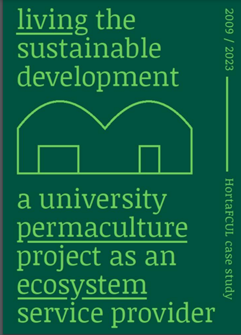
The HortaFCUL
How it came about
The HortaFCUL project was created at the Faculty of Sciences of the Lisbon University in 2009, led by a group of students interested in the topic of permaculture and how it could provide a solution to some of the current ecological, social and economic problems.
With the support of the college board and the dedication of some volunteers, HortaFCUL is a permanent food garden next to the C2 building, a space that connects agriculture to gardening, integrates a constantly changing social dynamic, a space that is considered the heart of the project.

Objectives
This project emerged with the aim of raising awareness and demonstrating more ecological practices, based on the ethics, principles, strategies, techniques and tools proposed by permaculture.
It aims to enhance the campus' ecosystem services and, thus, contribute to the pursuit of the Sustainable Development Goals (SDGs).
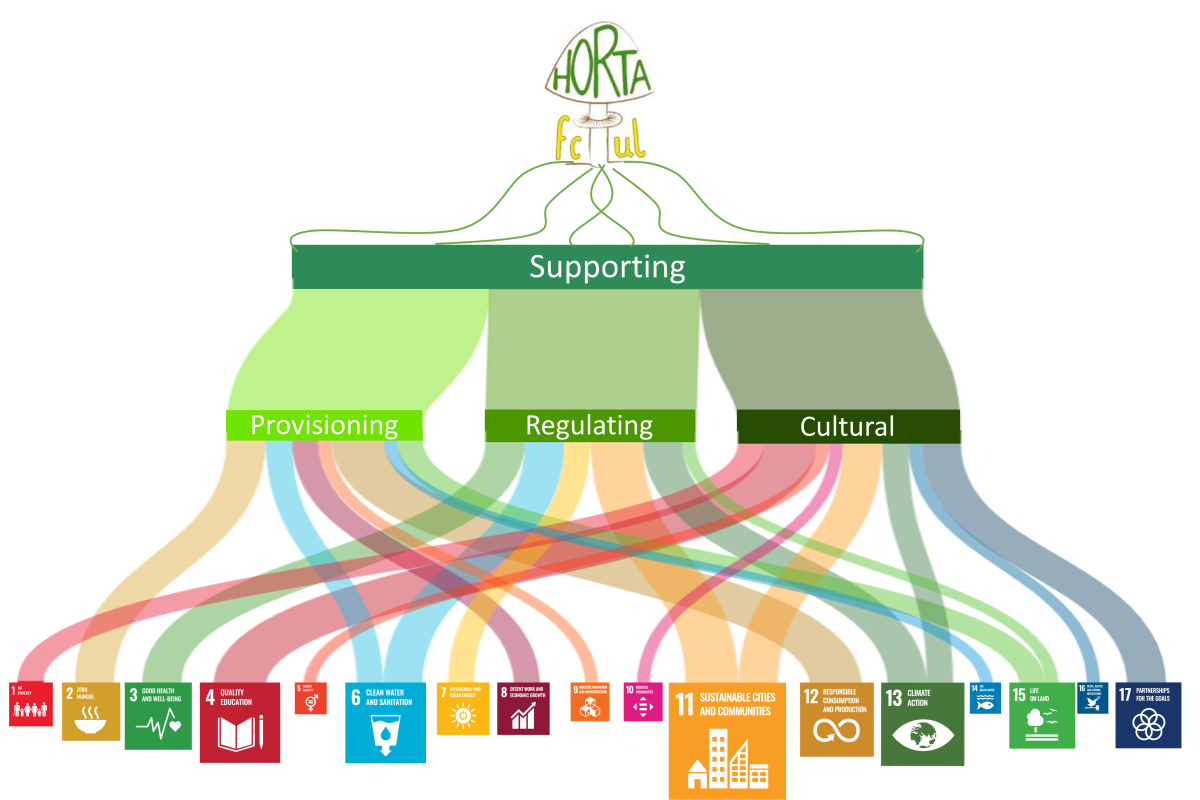
For more informations, see the HortaFCUL Report.
Compost and soil regeneration
The soils in the city are generally eroded and polluted, so when it comes to urban gardening, soil regeneration is one of the main challenges. One of the main ideas behind our action here, is not to think of organic waste as waste, but rather as a precious resource. We started composting gardening waste from our spaces from the start of the project. But we dreamed on extending this vision to the whole campus. To achieve that, we started composting the green waste coming from all green areas in campus and transform the process, from linearity to circularity. Today, we have the important role of doing all of this locally. This process reduces carbon emissions and the ecological footprint of the campus, and it diminishes the costs of the whole operation. To make it happen, we designed a larger composter and made the dream come true! Simultaneously, we use worms to make vermicompost from the leftovers of some of the cafeterias and canteens of the campus.
More than plants, we grow soil in an urban environment, and we are progressing towards turning the organic food “waste” management of the college into a circular process, a closed cycle, contributing significantly to the environmental sustainability of the campus.
Gardening for biodiversity
We invite you to look at Nature. Find the secret corners, the leftover pieces, the seemingly abandoned spots in a garden (yours or your neighbor's). You might be surprised to find a web of interactions. If we look at natural systems, we rarely find plants growing in straight, evenly spaced lines - instead, polycultures are Nature's way of farming. Furthermore, in addition to plants, there is an intricate web of life and relationships between them, animals (especially insects) and fungi. In all these relationships, there is competition, parasitism and mutualism in symbiosis. Nature can seem a little chaotic when compared to most man-made gardens. But in natural chaos there is an "order". In general, what we try to do in permaculture is to imitate natural patterns and reinvent them in a way that increases the diversity of all life forms and is simultaneously useful and productive for humans.
But then, how do we do it?
The idea is that, more than just doing agriculture, we are creating ecosystems. These ecosystems are intended to be productive landscapes for people, but also for other beings. Therefore, we grow different types of plants (vegetables, shrubs, trees) in different ways (swales, raised beds, greenhouses). By increasing plant diversity, we are increasing insect and fungal diversity. All life forms on Earth have been evolving together for millions of years until today. By growing a diverse garden rather than a monoculture, we are growing a garden that is also more resilient.
Sociocracy
The HortaFCUL project is coordinated and managed by a team of volunteers, called "Guardians" of Horta. These represent the first circle of people, responsible for the project, its maintenance and development, through decision-making and activity planning.
There is also a second circle of people who collaborate and help with specific project activities, which we call "Friends of Horta".
The third circle of people are those who participate in our events and workshops, sharing with us their views and interest in permaculture.
The project is organized according to a non-hierarchical sociocracy model, with weekly meetings where all decisions are taken as a group by the guardians and where all ideas, criticisms and suggestions are seen as an added value and an opportunity to improve our techniques and methodologies.
The entire project is based on the desire of those involved to learn more about the topic and their voluntary dedication to perpetuating an original and unique project for future generations of students at the Faculty of Sciences of Lisbon University.
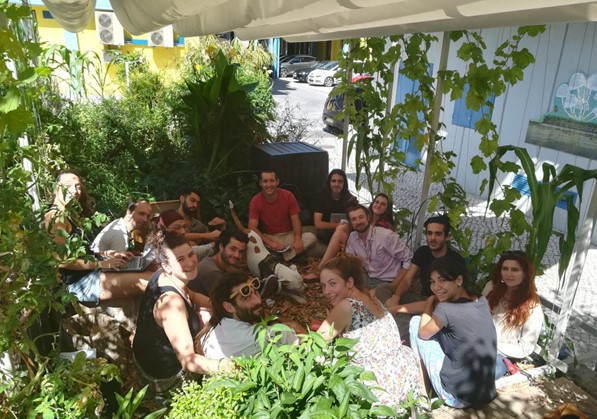
What is Permaculture?
Concept and definitions
The "Permaculture" concept dates to the 1970s and was first systematized by Australians Bill Mollison and David Holmgren. It results from the contraction of two words - “permanent” and “culture” - and is a holistic approach focused on solutions for a Permanent Culture that, based on Ethics and through Principles, uses proactive Strategies using innovative Techniques and Tools.
Although quite concrete, permaculture has several definitions depending on the experience and creativity of those who define it. One definition from the authors is:
Permaculture is the conscious planning of landscapes that imitate the patterns and relationships found in nature, producing an abundance of food, structures and energy to provide for local needs. It brings together diverse ideas, skills and ways of life that need to be rediscovered and developed in order to motivate us to change from the condition of dependent consumers to productive and responsible citizens.
(David Holmgren)
Ethics and principles
At the heart of Permaculture are its three ethics that are unconditionally integrated into the activities developed and interconnected: Caring for the Earth; Take care of People; Fair Share.
Caring of the Earth: Our planet is our only resource. Not only are human activities entirely dependent on it, but also all other forms of life that inhabit it. The protection and conservation of ecosystems and biodiversity will be essential for the future of our species. Thus, caring for the earth is a fundamental ethic for the sustainable development of human populations.
To follow this ethics, HortaFCUL is aware that all its activities have an ecological impact. It is up to us to choose options in greater balance with Nature.
Caring for People: Permaculture also has a very important social aspect, given that we organize ourselves in an interdependent way. Taking care of each other is essential for a fair and balanced society, with less inequality and competitiveness. Instead, permaculture focuses on cooperation, taking advantage of diversity and synergy between elements, in this case, people.
We apply this ethics at HortaFCUL through respect for all employees, reflection on the way we organize ourselves, communicate, make decisions and share responsibilities.
Fair Share: This ethic refers to the redistribution of the surplus created by activities, contributing to greater inter and intra-specific equity as well as inter and intra-generational.
This sharing of surpluses can be practiced in a variety of ways, from sharing material goods, such as food and space, to non-material goods, such as knowledge, experience, time or even good mood and joy.
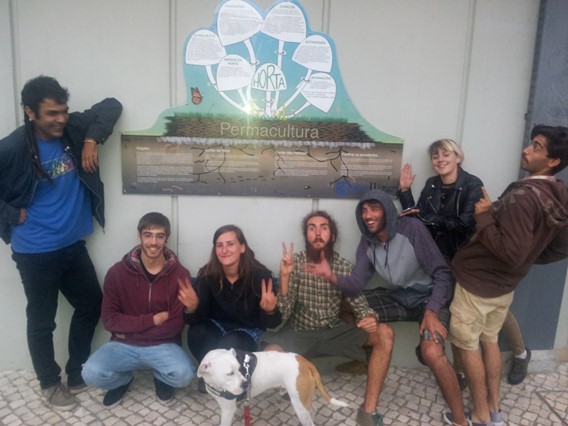
Considering this, at HortaFCUL we try to close cycles, not only sharing and reusing resources, but also transforming waste from some systems into raw materials from others.
The spaces with contributions from HortaFCUL
HortaFCUL guardians have been expanding their area of intervention and contributing directly and indirectly to various spaces on the FCUL campus.
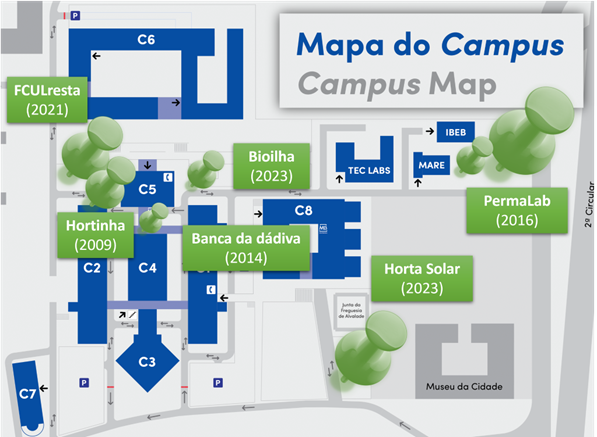
C2's tiny garden
HortaFCUL tiny garden at C2 was the first space created by the project and has always been considered its birthplace and reference. It was created in 2009, but over time it has undergone successive renovations and expansions, following the pace of project development.
It has a small lake, built in 2010, which adds diversity to the project, allowing it to house plant species that are more dependent on water and aquatic species.
In 2013, the garden received a bioconstruction made of reeds, thus enhancing its aesthetics, creating a sheltered leisure space and enabling the growth of climbing species, such as kiwis. Later, in 2018, the shelter was rebuilt with a more durable solution.
In 2015, in the International Year of Soils, integrated the artistic component into the project with the creation of a didactic mural made in graffiti that represents the evolution of the planet and life.
After creating a diversity of elements, the development of the ecosystem has been natural and is today a multifunctional agroforest where the various plant strata are in continuous development, a space measuring around 150m2 of low maintenance and permanent nature.
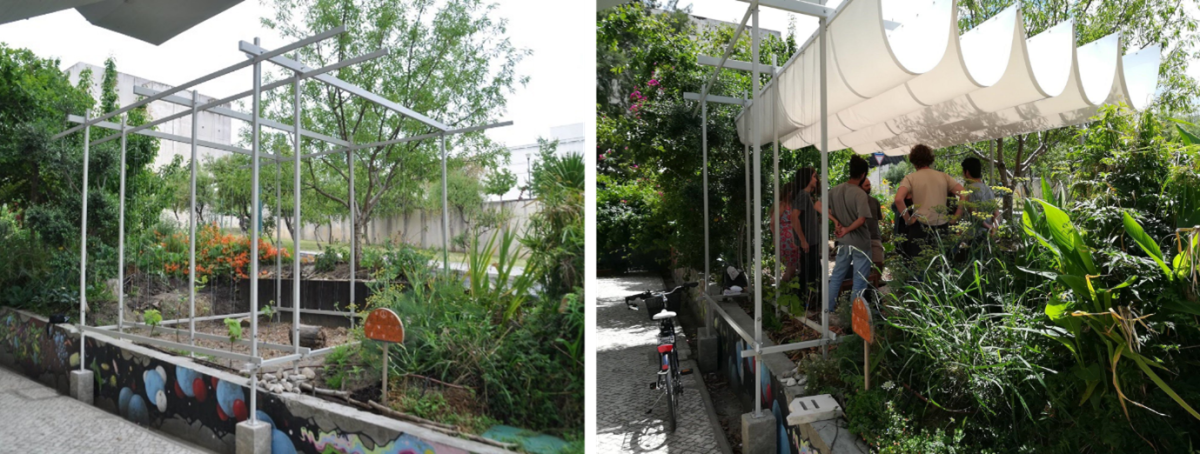
Gift economy spot
Since 2014, HortaFCUL has maintained a small gift economy spot in the center of the campus, called “Banca da Dádiva”, where it develops and tests the gift economy model with the FCUL community. This alternative approach to the market economy model states that the consumer determines the value of a product (generally in monetary terms) according to what he considers fair, both in relation to his own socioeconomic condition and the consumers valuation of the work invested in the production of a given product. good. This model is only viable when there is a 'contract' of trust between the two parties (consumer and producer), which is why many consider it challenging in terms of implementation. At “Banca da Dádiva”, HortaFCUL provides goods that are seen as surplus from its activity in exchange for a donation to the project. The money raised at the bank is used to finance the project's activities and initiatives. The two main products made available to the academic community are compost and plants. See the article Banca da Dádiva da HortaFCUL to learn more about this space..
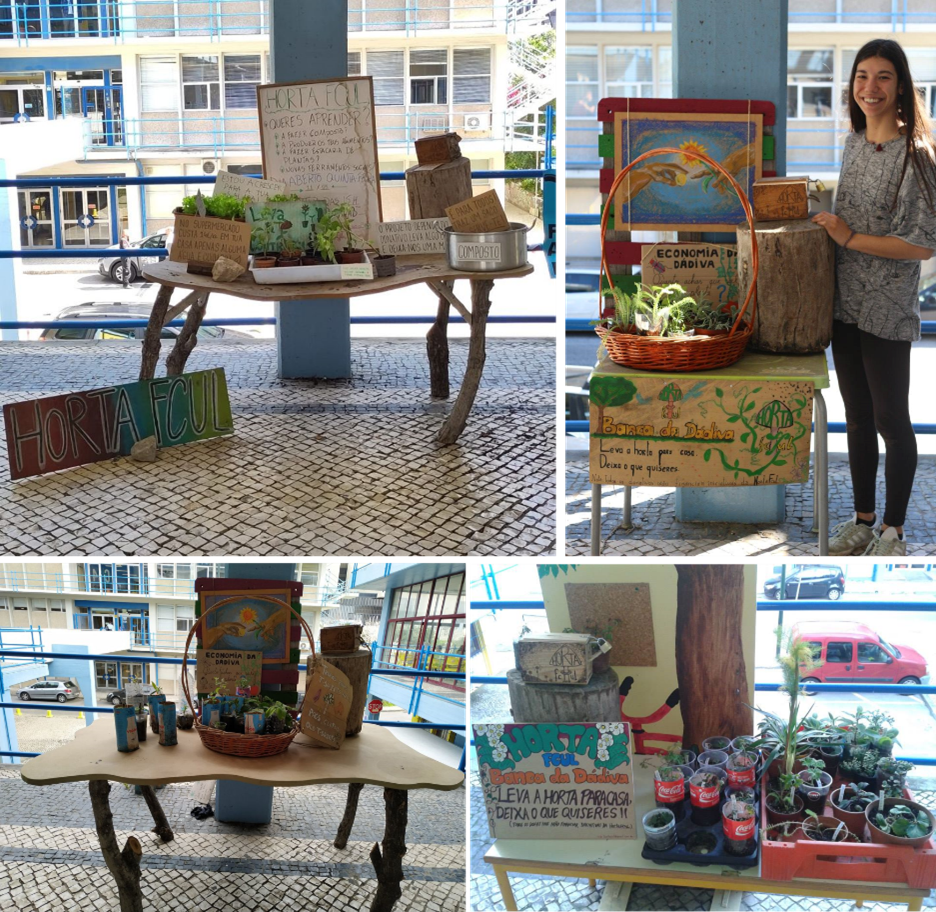
Permalab
See all the information on this project on the page https://ciencias.ulisboa.pt/en/permalab.
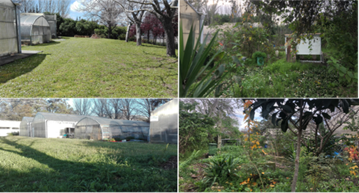
FCULresta
See all the information on this project on the page https://ciencias.ulisboa.pt/en/fculresta.
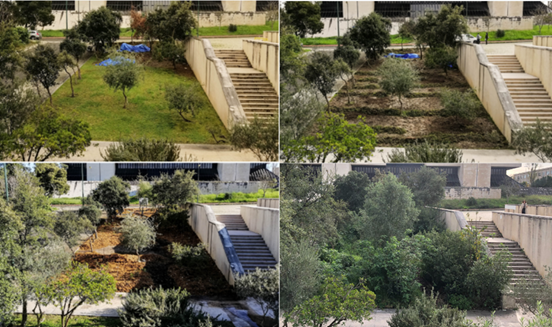
BioIlhas
See all the information on this project on the page https://ciencias.ulisboa.pt/en/bioislands.
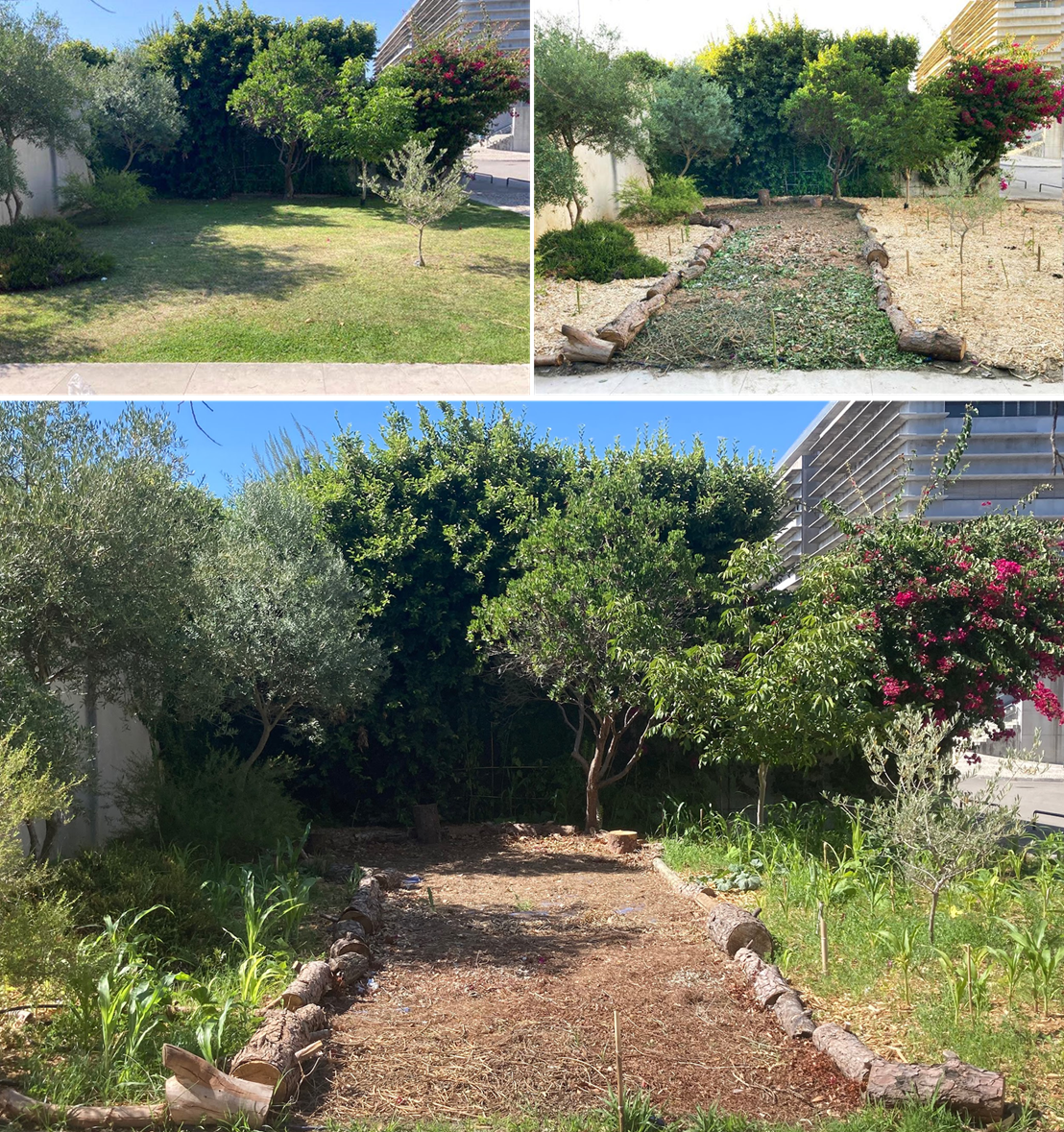
Solar Garden
See all the information on this project on the page https://ciencias.ulisboa.pt/en/solar-garden.
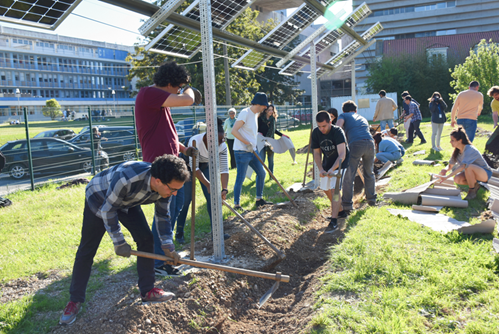
Important links:
Email: hortafcul@gmail.com
Facebook: https://www.facebook.com/hortafcul
Instagram: https://www.instagram.com/hortafcul
Youtube: https://www.youtube.com/@TheTeamhorta
News:
- HortaFCUL wins LUSH Prize https://ciencias.ulisboa.pt/en/news/05-06-2025/hortafcul-wins-lush-spring-prize-for-permaculture-work
- From waste to wealth: CIÊNCIAS’ journey to sustainable organic recycling (newsletter Marie Curie Alumni Association)
- HortaFCUL: um pedaço de campo em plena cidade (lisboaparapessoas.pt)
- Horta FCUL é um pequeno oásis e a ciência faz-se com as mãos na terra (amensagem.pt)
- HortaFCUL: há 15 anos que este projecto alimenta uma comunidade | Reportagem | PÚBLICO (publico.pt)
- Actuar no local, pensar no global: 15 anos de HortaFCUL (lisboaparapessoas.pt)
- Garden planted in carpets lines walls and maintains temperature in the kitchen of FCUL (Lusa News Agency)
- Video of the Garden planted in carpets covers walls and maintains temperature in FCUL's kitchen (LusaVideo)
- Garden planted in carpets lines walls and maintains temperature in FCUL's kitchen - Radio Vibration - More music that makes you vibrate
- Garden planted in carpets lines walls and maintains temperature in the college kitchen in Lisbon (Article in JN)
- HortaFCUL's 2024 activity report is available for reading.
Project members: Afonso Ferreira, Ana Catarina Narciso, Ana Morais, André Alves, Anna Grassi, Annika Haag, António Alexandre, António Vaz Pato, Beatriz Vicente, Bernardo Sá-Nogueira, Catarina Alonso, Catarina Pereirinha, Clarisse Hetier, Daniel Lopes, Danyal Habibo, David Avelar, Diogo Mendes, Diogo Ribeiro, Euclides Póvoa, Filipe Silva, Florian Ulm, Francisco Ferreira, Francisco Oliveira, Francisco Silva, Gil Penha-Lopes, Guilherme Weishar, Inês Afonso, Inês Besugo, Inês Costa, Inês Santos, Íris Mota, Ivo Rosa, Jan Frederic, Joana Jerónimo, Joana Pimenta, Joana Rodrigues, João Ramalho, João Sousa, Jobim Convié, Jorge Gonçalves, Júlio Teixeira, Madalena Gaspar, Madalena Horta, Madalena Mariano, Mafalda Chitas, Manuel Botelho, Mar, Marcin Makowski, Maria Cardoso, Maria Cruz, Maria Nuñez, Marina Luque, Marissa Verhoeven, Marta Ferreira, Marta Pernas, Matías MG, Matilde Henriques, Miguel Resendes, Miguel Ribeiro, Miguel Sousa, Nadine Wulf, Nuno Fragoeiro, Pedro Farrancha, Pedro Moreira, Pedro Rosa, Raquel Vicente, Rebecca Mateus, Renata Reynaud, Rosa Val do Rio, Rui Monteiro, Sara dal Corso, Sílvia Bacci, Sofia Moinhos, Tiago Dias, Tiago Silva, Tomás Simões.
For further information, contact sustentabilidade@ciencias.ulisboa.pt.


